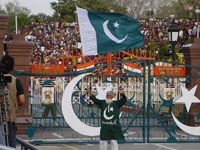Commonwealth foreign ministers committee to discuss on Pakistan suspending
The suspension of Pakistan from the 53-nation group will be discussed at the Commonwealth foreign ministers committee meeting.

The Commonwealth, largely made up of Britain and its former colonies, has given Pakistan's military ruler Gen. Pervez Musharraf a Thursday deadline to lift emergency rule and step down as army chief.
Commonwealth Secretary-General Don McKinnon said the vote would take place later Thursday, the eve of a summit of Commonwealth heads of government.
The committee members, "are fully aware of all the information flowing out of Islamabad towards the Commonwealth leaders ... They are taking this into account as they address this rather difficult issue," McKinnon told journalists.
British Prime Minister Gordon Brown told reporters on Thursday that Musharraf has assured him that he will "do his utmost to lift," the state of emergency before January parliamentary elections and step down as army chief "as soon as possible."
On Thursday, a Pakistani Supreme Court stacked with judges loyal to Musharraf cleared the way for him to rule as a civilian president, deciding against a final challenge blocking ratification of his election last month.
Pakistan was last kicked out of the organization in 1999 after Musharraf seized power in a coup. It took the country five years to be reinstated.
Britain's Queen Elizabeth II, the head of the Commonwealth, commended the Ugandan government Thursday for its efforts to end the "devastating conflict," in northern Uganda where a rebel group has waged a brutal 20-year insurgency.
Ugandan government and rebel negotiators have been in on-and-off talks for 15 months now, mediated by the autonomous regional government of neighboring Southern Sudan, during which they have agreed to a truce and are working on a framework for reconciliation.
Uganda is also to be commended for its contribution to peacekeeping in Somalia, which is "a tribute to the courage and professionalism of Uganda's armed forces," the 81-year-old monarch told the Ugandan parliament.
Uganda has had about 1,800 troops in Somalia's capital, Mogadishu, since March as part of African Union efforts to bring stability there. But no other African country has sent troops despite endorsing an African Union proposal to have an 8,000-strong mission in the Horn of Africa nation. The deployments have been delayed because of the lack of funding and logistical help.
The queen also told the Ugandan parliament that the East African nation has made, "considerable advances in spite of periods of adversity," since her last visit to the country 50 years ago.
"For Ugandans the deliberations and decisions of this house, together with your respect for the rule of law, have had and will continue to have an essential bearing on the country's success in addressing many serious challenges," she told the lawmakers who had packed parliament.
The queen visited an AIDS clinic in the Ugandan capital, Kampala, before her speech to Parliament. It was her first visit to such a clinic.
"The scourge of HIV infection and AIDS has touched the lives of too many Ugandan people," she said. "Centers such as this, which the government of Uganda has done so much to encourage, are essential in achieving our common aim of controlling this cruel disease."
The queen will open the Commonwealth summit on Friday.
Subscribe to Pravda.Ru Telegram channel, Facebook, RSS!





